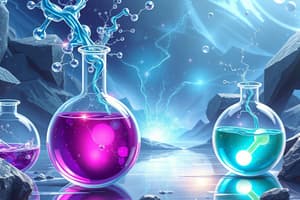Podcast
Questions and Answers
Of the species below, only which one is not an electrolyte?
Of the species below, only which one is not an electrolyte?
- Cl
- K
- Na
- Ar (correct)
The balanced molecular equation for complete neutralization of H2SO4 by KOH in aqueous solution is __________.
The balanced molecular equation for complete neutralization of H2SO4 by KOH in aqueous solution is __________.
H2SO4(aq) + 2KOH(aq) ------ 2H2O(l) + K2SO4(aq)
Aqueous potassium chloride will react with which one of the following in an exchange (metathesis) reaction?
Aqueous potassium chloride will react with which one of the following in an exchange (metathesis) reaction?
- Sodium Nitrate
- Calcium Carbonate
- Lead Nitrate (correct)
- Silver Acetate
Aqueous solutions of a compound did not form precipitates with Cl-, Br-, I-, SO42-........ This compound is __________.
Aqueous solutions of a compound did not form precipitates with Cl-, Br-, I-, SO42-........ This compound is __________.
The net ionic equation for formation of an aqueous solution of NiI2 accompanied by evolution of CO2 gas via mixing solid NiCO3 and aqueous hydriodic acid is __________.
The net ionic equation for formation of an aqueous solution of NiI2 accompanied by evolution of CO2 gas via mixing solid NiCO3 and aqueous hydriodic acid is __________.
When aqueous solutions of which compounds are mixed, a precipitate forms?
When aqueous solutions of which compounds are mixed, a precipitate forms?
In which reaction does the oxidation number of oxygen increase?
In which reaction does the oxidation number of oxygen increase?
Which compound has the atom with the highest oxidation number?
Which compound has the atom with the highest oxidation number?
Which of these metals will be oxidized by the ions of aluminum?
Which of these metals will be oxidized by the ions of aluminum?
Of the reactions below, only __________ is not spontaneous.
Of the reactions below, only __________ is not spontaneous.
Based on the activity series, which one of the reactions below will occur?
Based on the activity series, which one of the reactions below will occur?
The net ionic equation for the dissolution of zinc metal in aqueous hydrobromic acid is __________.
The net ionic equation for the dissolution of zinc metal in aqueous hydrobromic acid is __________.
Sodium does not occur in nature as Na(s) because __________.
Sodium does not occur in nature as Na(s) because __________.
Which solution contains the largest number of moles of chloride ions?
Which solution contains the largest number of moles of chloride ions?
What volume (mL) of a concentrated solution of sodium hydroxide (6.00 M) must be diluted to 200.0 mL to make a 0.880 M solution of sodium hydroxide?
What volume (mL) of a concentrated solution of sodium hydroxide (6.00 M) must be diluted to 200.0 mL to make a 0.880 M solution of sodium hydroxide?
What mass (g) of potassium chloride is contained in 430.0 mL of a potassium chloride solution that has a chloride ion concentration of 0.193 M?
What mass (g) of potassium chloride is contained in 430.0 mL of a potassium chloride solution that has a chloride ion concentration of 0.193 M?
The point in a titration at which the indicator changes is called the __________.
The point in a titration at which the indicator changes is called the __________.
Which one of the following substances is produced during the reaction of an acid with a metal hydroxide?
Which one of the following substances is produced during the reaction of an acid with a metal hydroxide?
Which of the following is an oxidation-reduction reaction?
Which of the following is an oxidation-reduction reaction?
Which one of the following is not true concerning 2.00 L of 0.100 M solution of Ca(PO4)2?
Which one of the following is not true concerning 2.00 L of 0.100 M solution of Ca(PO4)2?
A 0.200 M K2SO4 solution is produced by __________.
A 0.200 M K2SO4 solution is produced by __________.
Flashcards are hidden until you start studying
Study Notes
Electrolytes
- Argon (Ar) is not an electrolyte, unlike other common species.
- Electrolytes are substances that dissociate into ions in solution and conduct electricity.
Neutralization Reactions
- H₂SO₄ neutralizes KOH to form water and K₂SO₄ in a balanced equation: H₂SO₄(aq) + 2 KOH(aq) → 2 H₂O(l) + K₂SO₄(aq).
Metathesis Reactions
- Aqueous potassium chloride reacts with lead nitrate in an exchange reaction to form precipitates.
Solubility and Precipitates
- (NH₄)₂S does not form precipitates with common anions Cl⁻, Br⁻, I⁻, and SO₄²⁻, indicating its high solubility.
Net Ionic Equations
- Formation of aqueous NiI₂ from solid NiCO₃ and hydriodic acid is represented by the reaction: NiCO₃(s) + 2 H⁺(aq) → H₂O(l) + Ni²⁺(aq).
Precipitate Formation
- Mixing NiBr with AgNO₃ results in the formation of a precipitate.
Oxidation States
- In the reaction 2 H₂O(l) → 2 H₂(g) + O₂(g), the oxidation state of oxygen increases as it is converted into O₂.
Oxidation Numbers
- Magnesium in MgSO₃ has the highest oxidation number among provided compounds.
Redox Reactions
- Magnesium can be oxidized by aluminum ions, highlighting its reactivity compared to aluminum.
Spontaneity of Reactions
- Certain reactions are non-spontaneous; identification requires understanding of thermodynamics and reaction conditions.
Activity Series
- Based on the activity series, specific reactions will occur based on the reactivity of metals involved.
Net Ionic Equations for Dissolution
- The dissolution of zinc metal in aqueous hydrobromic acid has a specific net ionic equation that students should learn.
Sodium in Nature
- Sodium does not exist as solid Na due to its high reactivity, leading it to react with other substances.
Concentration Calculations
- To prepare a 0.880 M solution of sodium hydroxide from a concentrated 6.00 M solution, calculations for dilution are necessary.
Mass Calculations
- The mass of potassium chloride in a solution with a specified chloride ion concentration can be calculated from solution volume and molarity data.
Titration Terminology
- The titration endpoint, marked by an indicator change, is crucial for determining the completion of a reaction.
Acid-Base Reactions
- The product of an acid reacting with a metal hydroxide typically involves water and a salt.
Oxidation-Reduction Identifications
- Identifying oxidation-reduction reactions is essential for understanding electron transfer processes.
Solution Characteristics
- Characteristics about molarity and volume of solutions, such as a 2.00 L of 0.100 M Ca(PO₄)₂, are necessary for solving stoichiometric problems.
Solution Preparation
- A 0.200 M K₂SO₄ solution can be prepared through a specific process, illustrating practical application of concepts.
Studying That Suits You
Use AI to generate personalized quizzes and flashcards to suit your learning preferences.




